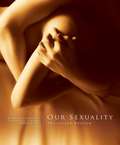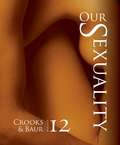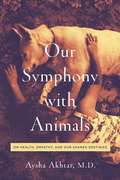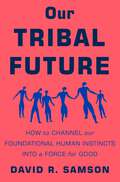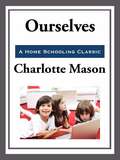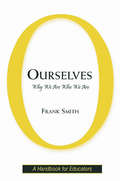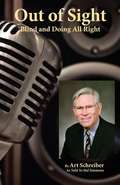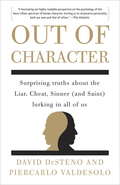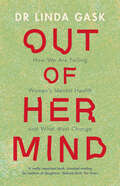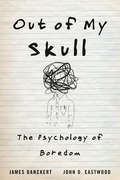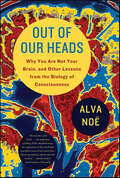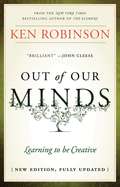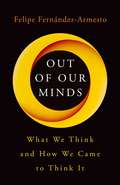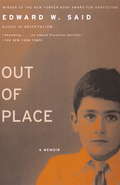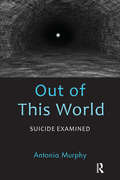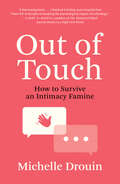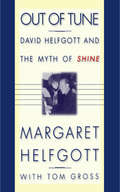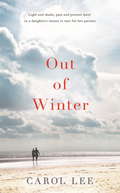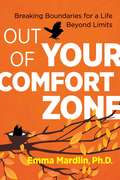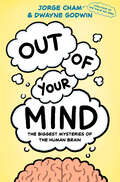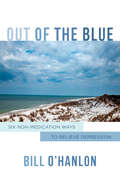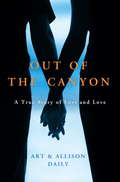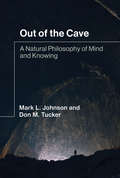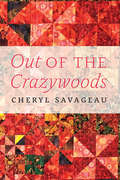- Table View
- List View
Our Sexuality (Mindtap for Psychology)
by Robert L. Crooks Karla BaurThis book is the most respected and authoritative college textbook available on human sexuality. Written in a direct, non-judgmental manner, this thirteenth edition has been thoroughly and carefully updated to reflect the most current research findings and psychosocial developments. It is the first college text to deliver cutting-edge and in-depth emphasis on the impact of politics on sexuality. The authors keep you interested with the most exciting, emerging research and coverage, and focus on strengthening your self-awareness and sexual intelligence.
Our Sexuality (Twelfth Edition)
by Karla Baur Robert CrooksThis is the most respected and authoritative college textbook available on human sexuality. Written in a direct, non-judgmental manner, this edition of OUR SEXUALITY has been thoroughly and carefully updated to reflect the most current research findings. It is the first college text to bring cutting-edge and in-depth emphasis on the impact of politics on sexuality. Crooks and Baur keep you interested with the most exciting, emerging research and coverage, and focus on strengthening healthy communication among partners. The authors also have revised their overall coverage on maintaining a responsible and healthy sexual relationship, with greater attention to diversity and inclusiveness.
Our Symphony with Animals: On Health, Empathy, And Our Shared Destinies
by Aysha AkhtarA leader in the fields of animal ethics and neurology, Dr. Aysha Akhtar examines the rich human-animal connection and how interspecies empathy enriches our well-being. Deftly combining medicine, social history and personal experience, Our Symphony with Animals is the first book by a physician to show how deeply the well-being of humans and animals are entwined. Interwoven throughout is Dr. Akhtar’s own story of being a young girl who was bullied in school and sexually abused by her uncle. Feeling abandoned by humanity, it was only when she met Sylvester, a dog who had also been abused, that she found strength for both of them. Against the backdrop of her inspiring story, Dr. Akhtar asks, what do we gain when we recognize our kinship with animals? She travels around the country to tell the stories of a varied cast of characters—including a former mobster, an industrial chicken farmer, a Marine veteran—and comes face to face with a serial killer. Through storytelling that is entertaining, profound, and touching, Dr. Akhtar reveals what happens when we both break and forge bonds with animals. She demonstrates how humans are neurologically designed to empathize with animals, and how violence against them goes against our nature. In equal measure, the love and friendship we give to other species biologically reverberates back to us. Humanity’s compassion for animals is the next step in our species’ moral evolution and a vital component of our own health. Our Symphony with Animals is the definitive account for why our relationships with animals matter.
Our Tribal Future: How to Channel Our Foundational Human Instincts into a Force for Good
by David R. SamsonAn astounding and inspiring look at the science behind tribalism, and how we can learn to harness it to improve the world around us.What do you think of when you hear the word “tribalism?” For many, it conjures images of bigotry, xenophobia, and sectarian violence. Others may envision their own tribe: family, friends, and the bonds of loyalty that keep them together. Tribalism is one of the most complex and ancient evolutionary forces; it gave us the capacity for cooperation and competition, and allowed us to navigate increasingly complex social landscapes. It is so powerful that it can predict our behavior even better than race, class, gender, or religion. But in our vast modern world, has this blessing become a curse?Our Tribal Future explores a central paradox of our species: how altruism, community, kindness, and genocide are all driven by the same core adaptation. Evolutionary anthropologist David R. Samson engages with cutting-edge science and philosophy, as well as his own field research with small-scale societies and wild chimpanzees, to explain the science, ethics, and history of tribalism in compelling and accessible terms.This bold and brilliant book reveals provocative truths about our nature. Readers will discover that tribalism cannot, and should not, be eliminated entirely—to do so would be to destroy what makes us human. But is it possible to channel the best of this instinct to enrich our lives while containing the worst of its dangers?
Ourselves
by Charlotte MasonOurselves, the fourth volume of Charlotte Mason's Classic Homeschooling Series, is a character curriculum book written directly to children. Book I, Self-Knowledge, is for elementary school students; Book II, Self-Direction, is for older students. Self-Knowledge discusses our human desires and appetites; the "helpers" in our minds, such as intellect, sense of beauty, imagination, and reason; the ways in which we feel and express love for others, including sympathy, kindness, generosity, gratitude, courage, loyalty, and humilty; and truth, justice, and integrity; and ends by encourages children to develop the habit of being useful. Self-Direction is an in-depth discussion of the conscience and virtues such as temperance, chastity, fortitude, and prudence; the will and self-control; and the soul and its capacities, such as prayer, thanksgiving, faith, and praise. Charlotte Mason was a late nineteenth-century British educator whose ideas were far ahead of her time. She believed that children are born persons worthy of respect, rather than blank slates, and that it was better to feed their growing minds with living literature and vital ideas and knowledge, rather than dry facts and knowledge filtered and pre-digested by the teacher. Her method of education, still used by some private schools and many homeschooling families, is gentle and flexible, especially with younger children, and includes first-hand exposure to great and noble ideas through books in each school subject, conveying wonder and arousing curiosity, and through reflection upon great art, music, and poetry; nature observation as the primary means of early science teaching; use of manipulatives and real-life application to understand mathematical concepts and learning to reason, rather than rote memorization and working endless sums; and an emphasis on character and on cultivating and maintaining good personal habits. Schooling is teacher-directed, not child-led, but school time should be short enough to a
Ourselves: Why We Are Who We Are
by Frank SmithThis book delves into how we come to terms with ourselves, with other people, and with the world in general. It is about how we come to be what we are, and to think the way we do. It is a book about influences on this process. A particular influence to which Smith gives central consideration is language, not just in terms of the communicative networks in which it engages us--the “information” that presents itself to us--but in the largely unsuspected framework for thought that lies within language itself. He also considers deeply the role of technology. This is a book of description, not of explanations--these are two quite different intellectual territories. Smith writes about what can be observed, not philosophized about. Thus he does not discuss the inner workings of the human brain. His claim is that what he is interested in--thinking, learning, understanding, remembering--have never been found in the brain. The aim is to describe the scope and limits for how we can be seen to think, learn, understand, and remember--but not to “explain” such behavior by recourse to hypothetical inner entities. Ourselves speaks especially to educators. It outlines the possibilities and limitations inherent in all of us. It delineates who we are, but also stresses that no two people are the same, that what we become depends on our journeys in life and the people we encounter on the way. The formal part of learning that is called education is particularly sensitive to the role of people who organize critical experiences for us, our teachers. The brief summaries at the end of each chapter reinforce and highlight points that are of particular relevance to teachers. Researchers, professionals, and graduate students across the fields of literacy education, psychology of reading, learning theory, human learning, educational psychology, and psycholinguistics will find this book compelling.
Out Of Sight: Blind And Doing All Right
by Art Schreiber Hal SimmonsA high level radio news broadcast executive, Art Schreiber suddenly lost his eyesight. At the top of his career as a radio station general manager, Art awoke one morning at a resort near Santa Fe, New Mexico, unable to see. His world was in complete darkness. After facing total despair, Art plotted his return to the top while learning to live life in a new way in a new world. Art's refusal to fold his tent when his eyesight failed and his struggle to live life to the fullest will inspire any person who reads his story. Art's greatest reward in life is encouraging and motivating others who face similar challenges.
Out of Character
by Piercarlo Valdesolo David DestenoHave you ever wondered why a trumpeter of family values would suddenly turn around and cheat on his wife? Why jealousy would send an otherwise level-headed person into a violent rage? What could drive a person to blow a family fortune at the blackjack tables? Or have you ever pondered what might make Mr. Right leave his beloved at the altar, why hypocrisy seems to be rampant, or even why, every once in awhile, even you are secretly tempted, to lie, cheat, or steal (or, conversely, help someone you never even met)? This book answers these questions and more, and in doing so, turns the prevailing wisdom about who we are upside down. Our character, argue psychologists DeSteno and Valdesolo, isn't a stable set of traits, but rather a shifting state that is subject to the constant push and pull of hidden mechanisms in our mind. And it's the battle between these dueling psychological forces that determine how we act at any given point in time. Drawing on the surprising results of the clever experiments concocted in their own laboratory, DeSteno and Valdesolo shed new scientific light on so many of the puzzling behaviors that regularly grace the headlines. For example, you'll learn: * Why Tiger Woods just couldn't resist the allure of his mistresses even though he had a picture-perfect family at home. And why no one, including those who knew him best, ever saw it coming. * Why even the shrewdest of investors can be tempted to gamble their fortunes away (and why risky financial behavior is driven by the same mechanisms that compel us to root for the underdog in sports). * Why Eliot Spitzer, who made a career of crusading against prostitution, turned out to be one of the most famous johns of all time. * Why Mel Gibson, a noted philanthropist and devout Catholic, has been repeatedly caught spewing racist rants, even though close friends say he doesn't have a racist bone in his body. * And why any of us is capable of doing the same, whether we believe it or not!A surprising look at the hidden forces driving the saint and sinner lurking in us all, Out of Character reveals why human behavior is so much more unpredictable than we ever realized. From the Hardcover edition.
Out of Her Mind: How We Are Failing Women's Mental Health and What Must Change
by Linda GaskFor centuries so called 'difficult women' have been labelled as 'hysterical' and 'out of their minds'. Today they wait longer for health diagnoses, often being told it's 'all in their heads'. Although healthcare systems are overburdened, why are women the first to feel the effects of this? Why is it so hard for women to find the kind of help they need? Why is no one listening to them? And why have so many lost faith in mental healthcare? Drawing on the lived experiences of women, alongside expert commentators, recent history, current events, and her own personal and professional experience, Dr Linda Gask explores women's mental healthcare today. In doing so she confronts her role as a psychiatrist, recalling experiences treating women and as a woman who has received mental healthcare, illustrating the dire need for more change, faster. Women can't all be out of their minds.
Out of My Skull: The Psychology of Boredom
by James Danckert John D. EastwoodNo one likes to be bored. Two leading psychologists explain what causes boredom and how to listen to what it is telling you, so you can live a more engaged life. We avoid boredom at all costs. It makes us feel restless and agitated. Desperate for something to do, we play games on our phones, retie our shoes, or even count ceiling tiles. And if we escape it this time, eventually it will strike again. But what if we listened to boredom instead of banishing it? Psychologists James Danckert and John Eastwood contend that boredom isn’t bad for us. It’s just that we do a bad job of heeding its guidance. When we’re bored, our minds are telling us that whatever we are doing isn’t working—we’re failing to satisfy our basic psychological need to be engaged and effective. Too many of us respond poorly. We become prone to accidents, risky activities, loneliness, and ennui, and we waste ever more time on technological distractions. But, Danckert and Eastwood argue, we can let boredom have the opposite effect, motivating the change we need. The latest research suggests that an adaptive approach to boredom will help us avoid its troubling effects and, through its reminder to become aware and involved, might lead us to live fuller lives. Out of My Skull combines scientific findings with everyday observations to explain an experience we’d like to ignore, but from which we have a lot to learn. Boredom evolved to help us. It’s time we gave it a chance.
Out of Our Heads: Why You Are Not Your Brain, and Other Lessons from the Biology of Consciousness
by Alva NoëAlva Noë is one of a new breed—part philosopher, part cognitive scientist, part neuroscientist—who are radically altering the study of consciousness by asking difficult questions and pointing out obvious flaws in the current science. In Out of Our Heads, he restates and reexamines the problem of consciousness, and then proposes a startling solution: Do away with the two hundred-year-old paradigm that places consciousness within the confines of the brain.Our culture is obsessed with the brain—how it perceives; how it remembers; how it determines our intelligence, our morality, our likes and our dislikes. It's widely believed that consciousness itself, that Holy Grail of science and philosophy, will soon be given a neural explanation. And yet, after decades of research, only one proposition about how the brain makes us conscious—how it gives rise to sensation, feeling, and subjectivity—has emerged unchallenged: We don't have a clue.In this inventive work, Noë suggests that rather than being something that happens inside us, consciousness is something we do. Debunking an outmoded philosophy that holds the scientific study of consciousness captive, Out of Our Heads is a fresh attempt at understanding our minds and how we interact with the world around us.
Out of Our Minds: Learning to be Creative
by Ken RobinsonOut of Our Minds is about why creativity matters so much, why people think they are not creative, how we arrived at this point, and what we can do about it.
Out of Our Minds: What We Think and How We Came to Think It
by Felipe Fernández-Armesto&‘Immensely learned and ambitious…seam-bursting eclecticism and polymathic brio… This is by any standards a significant book and its author deserves high praise.&’ Literary ReviewTo imagine – to see that which is not there – is the startling ability that has fuelled human development and innovation through the centuries. As a species we stand alone in our remarkable capacity to refashion the world after the pictures in our minds. Traversing the realms of science, politics, religion, culture, philosophy and history, Felipe Fernández-Armesto reveals the thrilling and disquieting tales of our imaginative leaps. Through groundbreaking insights in cognitive science, he explores how and why we have ideas in the first place, providing a tantalising glimpse into who we are and what we might yet accomplish. Fernández-Armesto shows that bad ideas are often more influential than good ones; that the oldest recoverable thoughts include some of the best; that ideas of Western origin often issued from exchanges with the wider world; and that the pace of innovative thinking is under threat.
Out of Place
by Edward W. Said<P>From one of the most important intellectuals of our time comes an extraordinary story of exile and a celebration of an irrecoverable past. <P>A fatal medical diagnosis in 1991 convinced Edward Said that he should leave a record of where he was born and spent his childhood, and so with this memoir he rediscovers the lost Arab world of his early years in Palestine, Lebanon, and Egypt. <P>Said writes with great passion and wit about his family and his friends from his birthplace in Jerusalem, schools in Cairo, and summers in the mountains above Beirut, to boarding school and college in the United States, revealing an unimaginable world of rich, colorful characters and exotic eastern landscapes. <P>Underscoring all is the confusion of identity the young Said experienced as he came to terms with the dissonance of being an American citizen, a Christian and a Palestinian, and, ultimately, an outsider. <P>Richly detailed, moving, often profound, Out of Place depicts a young man's coming of age and the genesis of a great modern thinker.
Out of This World: Suicide Examined
by Antonia MurphyThis book is intended for anyone with either an interest in suicide or suicidal behaviour. It is not aimed solely at the professional psychotherapist but at a broad range of professionals who encounter suicidal people in their work. It is also intended for those of us who have been touched by suicide personally. The book approaches suicide from the point of view of the suicidal state of mind and is intended to help us understand more about this condition. In its essence suicide is examined as a largely unconscious aggressive act having its roots in a perceived or real experience of thwarted childhood needs. The wounds of the suicidal person are often long held and deep. The suicidal person is pursued by haunting losses and the suicidal act comes from deep disturbance created by this and from the idea of death as an acting out of some form of suicidal fantasy. The quasi delusional and split quality of the act is examined - namely that suicide is both an act for and against the self.
Out of Touch: How to Survive an Intimacy Famine
by Michelle DrouinA behavioral scientist explores love, belongingness, and fulfillment, focusing on how modern technology can both help and hinder our need to connect.Millions of people around the world are not getting the physical, emotional, and intellectual intimacy they crave. Through the wonders of modern technology, we are connecting with more people more often than ever before, but are these connections what we long for? Pandemic isolation has made us even more alone. In Out of Touch, Professor of Psychology Michelle Drouin investigates what she calls our intimacy famine, exploring love, belongingness, and fulfillment and considering why relationships carried out on technological platforms may leave us starving for physical connection. Drouin puts it this way: when most of our interactions are through social media, we are taking tiny hits of dopamine rather than the huge shots of oxytocin that an intimate in-person relationship would provide. Drouin explains that intimacy is not just sex—although of course sex is an important part of intimacy. But how important? Drouin reports on surveys that millennials (perhaps distracted by constant Tinder-swiping) have less sex than previous generations. She discusses pandemic puppies, professional cuddlers, the importance of touch, &“desire discrepancy&” in marriage, and the value of friendships. Online dating, she suggests, might give users too many options; and the internet facilitates &“infidelity-related behaviors.&” Some technological advances will help us develop and maintain intimate relationships—our phones, for example, can be bridges to emotional support. Some, on the other hand, might leave us out of touch. Drouin explores both of these possibilities.
Out of Tune: David Helfgott and the Myth of Shine
by Margaret Helfgott Tom Gross"The Academy Award winning film Shine made pianist David Helfgott a household name. While purporting to be a true story, the movie is actually full of fabrications. Now for the first time, Margaret, David Helfgott's eldest sister, who knows him better than anyone from their early years, sets the record straight. Dispelling the many untruths propagated by the movie, Margaret tells the real story of her extraordinary brother, of a life, a career, and a legacy that will remain forever... Out Of Tune."--BOOK JACKET. Title Summary field provided by Blackwell North America, Inc. All Rights Reserved.
Out of Winter
by Carol LeeOUT OF WINTER is a personal account of how a father's sudden illness affects a family fraught by conflict over many years. It charts the process of grief which follows his death in 2008, and that of Carol Lee's mother only eight weeks later. Her mother's death, so swiftly after her father's, tests the limits of her ability to re-configure herself, to find who and what her mother and father are to her now, and to understand her brother's long flight into silence. In OUT OF WINTER, Carol Lee uncovers the history of people - her parents - whom, at the end, she comes to know and love. OUT OF WINTER confronts the idea of how well do we really know our parents?
Out of Winter
by Carol LeeOUT OF WINTER is a personal account of how a father's sudden illness affects a family fraught by conflict over many years. It charts the process of grief which follows his death in 2008, and that of Carol Lee's mother only eight weeks later. Her mother's death, so swiftly after her father's, tests the limits of her ability to re-configure herself, to find who and what her mother and father are to her now, and to understand her brother's long flight into silence. In OUT OF WINTER, Carol Lee uncovers the history of people - her parents - whom, at the end, she comes to know and love. OUT OF WINTER confronts the idea of how well do we really know our parents?
Out of Your Comfort Zone: Breaking Boundaries for a Life Beyond Limits
by Dr Emma MardlinA step-by-step guide to conquering fear and creating an unstoppable mindset • Offers a customizable approach that incorporates psychological, emotional, and physical techniques to release fear, limitations, and anxiety for good • Provides a before-and-after measure of your comfort zone with the Zone Test • Explores different types of fear, why we feel fear and how fear works in the brain, anxiety-reducing foods and how they work nutritionally, and the key psychological markers of a fearless personality • Includes resilience-builder challenges, anxiety-buster techniques, the intuition indicator tool, and “baby steps” methods to develop confidence When was the last time you did something that scared you? The last time you really pushed your boundaries, took a risk, and felt you not only bulldozed right through your fear but, in fact, used it to propel you forward? If you’ve ever successfully confronted and overcome anything, even just for a short while, you’ll undoubtedly relate to the profound and overwhelming sense of self-satisfaction that comes with it. This experience provides you with a true sense of freedom, allowing you to breathe effortlessly and fully absorb life, knowing the only thing that can ever really hold you back is you. Offering a step-by-step guide to incrementally breaking out of your comfort zone and confronting and transforming fear, Emma Mardlin, Ph.D., equips us with effective working tools to conquer our deepest fears in any context, be they small or big, and harness them to push us further toward our ultimate goals, purpose, and full potential. She provides the innovative Zone Test to measure your comfort zone before and after working through the book, tools such as the intuition indicator and RACE technique, and the thought-provoking “life discovery model” designed to support you in your new adventures once you’ve conquered your fears and let go of limitations. Offering practices to start the journey toward exciting positive change, she presents resilience-builder challenges, anxiety-buster techniques, practices for indestructible thinking, and “baby steps” to build confidence. She explores why we feel fear and how fear works in the brain, anxiety-reducing foods and how they work nutritionally, as well as the key psychological markers of a fearless “zone zero” personality. Whether you experience irrational fear, have a phobia that plagues you, look back on a lifetime of anxiety and limitations, or suffer from nerves and a lack of confidence, this guide provides a full range of comprehensive resources and tools to help you fully transform your fears, discover your true ambitions, and achieve everything you can in life.
Out of Your Mind: The Biggest Mysteries of the Human Brain
by Jorge Cham Dwayne GodwinFrom the creator of WE HAVE NO IDEA, an introductory journey into your own mind—if your inner voice had a Ph.D. in brain science, cracked jokes, and drew cartoons.Why do you love? Why do you lie? What makes you happy? Every single thought you have comes from one place: your brain. But what makes it tick? How much of it have we decoded, and how much of it remains an impenetrable mystery? Join best-selling author and online cartoonist Jorge Cham and neuroscientist Dwayne Godwin on a deep dive into the fascinating world of the human brain, in which they will explore questions such as: What is consciousness? Where is you in the brain? And do we have free will? All while illuminating everything we know (and DON&’T know) about one of the most complex objects in the known universe. Think of it as conversation-ammunition for your next cocktail party, or a quick fascinating read while you&’re in the bathroom (don&’t worry, the chapters aren&’t that long). Centered around questions we all ask ourselves at some point but don&’t usually have answers to, Out of Your Mind is an illustrated book about the brain that isn&’t too brainy. Playful, accessible, and deeply insightful, it&’s the one brain book that&’s truly accessible and suitable for all brains.
Out of the Blue: Six Non-Medication Ways to Relieve Depression
by Bill O'HanlonAlternatives to standard drug treatments for this common problem. Depression is one of the most common issues that people bring to therapy. It is also a mental health condition with several well-known and readily available medications to treat it. That said, every clinician knows that medications do not work for all clients, and even if they do work they can often come with unwelcome side effects that are difficult and hard to bear. In short, medications are not foolproof. Fortunately today, with rising interest in non-drug approaches, effective and easy-to-implement alternative strategies exist for dealing with depression in your clients, either in conjunction with medication treatments or on their own. Six of the best are presented in this book. With his characteristic mix of insightful clinical anecdote and personal narrative, seasoned therapist Bill O'Hanlon lays out six of his go-to non-medication strategies for clinicians to use with their own depressed clients. These include "marbling" (training people to intersperse happy memories with sad ones so that over time they move away from a feeling of such negativity); challenging isolation in clients (helping them to see the benefits of the social world); and understanding neuroplasticity and how it can be used to your clients' advantage. Bill O'Hanlon writes from a place of experience. As a youth, he was so severely depressed that he contemplated suicide. His successful rise from that dark place, some 30 years ago, can be seen as the starting point for this book. Many of the strategies he used to overcome his own illness he now puts forward here, with compassion and wisdom, so that other clinicians may benefit. Every depressed person experiences his or her own variety of the illness, and as therapists we need to help our clients discover their own paths to healing. Armed with the compelling, non-drug strategies in this book, clinicians will be able to do just that, opening up a new route to health and wellness. Whether you routinely prescribe psychotropic drugs or would never think of doing so, this book may offer just the advice you need to advance your therapy work and make a real difference in your depressed clients' lives.
Out of the Canyon
by Art Daily Allison Daily"Out of the Canyon" is the Dailys' inspiring story of love, healing, and acceptance, and of learning to live with the most inconceivable personal tragedies, move forward, and embrace life anew.
Out of the Cave: A Natural Philosophy of Mind and Knowing
by Mark L. Johnson Don M. TuckerFrom a philosopher and a neuropsychologist, a radical rethinking of certain traditional views about human cognition and behavior.Plato's Allegory of the Cave trapped us in the illusion that mind is separate from body and from the natural and physical world. Knowledge had to be eternal and absolute. Recent scientific advances, however, show that our bodies shape mind, thought, and language in a deep and pervasive way. In Out of the Cave, Mark Johnson and Don Tucker--a philosopher and a neuropsychologist--propose a radical rethinking of certain traditional views about human cognition and behavior. They argue for a theory of knowing as embodied, embedded, enactive, and emotionally based. Knowing is an ongoing process--shaped by our deepest biological and cultural values. Johnson and Tucker describe a natural philosophy of mind that is emerging through the convergence of biology, psychology, computer science, and philosophy, and they explain recent research showing that all of our higher-level cognitive activities are rooted in our bodies through processes of perception, motive control of action, and feeling. This developing natural philosophy of mind offers a psychological, philosophical, and neuroscientific account that is at once scientifically valid and subjectively meaningful--allowing us to know both ourselves and the world.
Out of the Crazywoods (American Indian Lives)
by Cheryl SavageauOut of the Crazywoods is the riveting and insightful story of Abenaki poet Cheryl Savageau&’s late-life diagnosis of bipolar disorder. Without sensationalizing, she takes the reader inside the experience of a rapid-cycling variant of the disorder, providing a lens through which to understand it and a road map for navigating the illness. The structure of her story—impressionistic, fragmented—is an embodiment of the bipolar experience and a way of perceiving the world.Out of the Crazywoods takes the reader into the euphoria of mania as well as its ugly, agitated rage and into &“the lying down of desire&” that is depression. Savageau articulates the joy of being consort to a god and the terror of being chased by witchcraft, the sound of voices that are always chattering in your head, the smell of wet ashes that invades your home, the perception that people are moving in slow motion and death lurks at every turnpike, and the feeling of being loved by the universe and despised by everyone you&’ve ever known. Central to the journey out of the Crazywoods is the sensitive child who becomes a poet and writer who finds clarity in her art and a reason to heal in her grandchildren. Her journey reveals the stigma and the social, personal, and economic consequences of the illness but reminds us that the disease is not the person. Grounded in Abenaki culture, Savageau questions cultural definitions of madness and charts a path to recovery through a combination of medications, psychotherapy, and ceremony.
